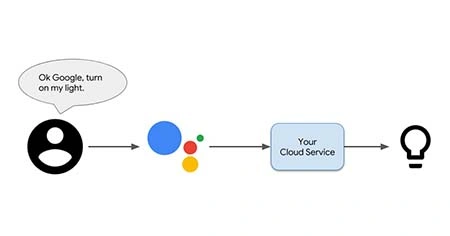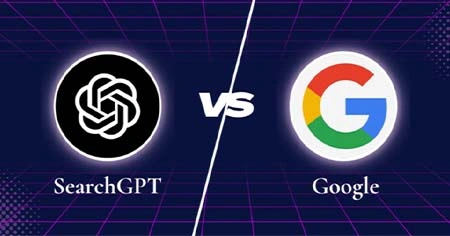As artificial intelligence continues to disrupt traditional technology landscapes, SearchGPT and Google have emerged as two leading platforms representing different paradigms in search technology. While Google remains the most popular and widely used search engine globally, SearchGPT has gained traction as an innovative AI-powered alternative.
SearchGPT, with its conversational interface, real-time web access, and transparent source attribution, changes how users discover information. Although it appears professional, the tool has approval and accuracy issues.
Can SearchGPT compete with Google? How does SearchGPT differ from AI overviews? What is the difference between SearchGPT and ChatGPT? Based on expert opinions, here's an in-depth look at how these two compare.
Marketers, SEO professionals, and publishers are all in a frenzy, wondering how SearchGPT may significantly impact publisher traffic. While it has potential, Google's search dominance appears unlikely to be challenged anytime soon.
SearchGPT: A Next-Generation AI-Powered Search Tool

SearchGPT is designed to revolutionize search by providing personalized, context-driven results. It integrates natural language processing (NLP) with conversational AI, enabling users to interact with the system in a dialogue format.
Key Features
- Contextual Understanding: Provides nuanced, conversational answers tailored to the query's intent.
- Generative Capabilities: Can create summaries, recommendations, and insights.
- Follow-Up Queries: Supports iterative questioning for refining results.
- AI-Powered Content Creation: Useful for research and brainstorming sessions.
How does SearchGPT work?

SearchGPT provides a clean and structured interface, utilizing various technologies, including Microsoft's Bing, for its live index, which differs from other AI-first search engines. The system governs when to access web results based on queries, although users can also directly enable web searches. Key aspects include:
Real-time information
The system's interface with Bing's index provides it with up-to-date information, allowing it to respond to real-time events in an educated manner.
Planning
Then, designing the working process and setting realistic deadlines is vital. However, you should be ready for some flexibility, as sometimes it is a bit tough to forecast whether you won't need to implement any adjustments in your solution just on the go.
Follow-up capability
The system retains context and may regulate follow-up inquiries to improve results.
Interactive elements
Users can view interactive stock graphs, maps with location pins, and dynamic data visualizations.
What Experts Say
Strengths:
- Personalized Search Experience: SearchGPT excels in understanding the context and offering tailored responses, which experts praise as a game-changer for research and content creation.
- Ease of Use for Complex Queries: Experts highlight its ability to break down multifaceted queries into comprehensible and actionable insights.
- Data Accuracy Concerns: Some experts caution about occasional inaccuracies due to reliance on outdated or limited datasets.
- Smaller Web Index: Unlike Google, SearchGPT does not have a comprehensive web index, which can limit its utility for exhaustive searches.
Google: The Search Engine Behemoth

Google, the world's most dominant search engine, provides users access to an expansive database of indexed web pages. It continues to innovate with tools like BERT (Bidirectional Encoder Representations from Transformers) for contextual search and Rich Snippets for user convenience.
Key Features
- Vast Web Index: Billions of pages indexed for comprehensive search results.
- Diverse Tools Integration: Maps, YouTube, Google Shopping, and more.
- Rich Snippets: Displays concise answers directly on the results page.
- Advanced Algorithms: AI-driven tools like BERT are used to understand context.
How does Google work?

Google is a dominant search engine that handles many inquiries daily. Understanding how Google works can help people and ai based search engine improve their internet presence. The method consists of three major stages: crawling, indexing, and ranking.
Crawling
Crawling is Google's principal method of collecting data from the Internet. Crawlers or spiders are automated programs that systematically scan the Internet, including website surfing, links, and data collection about the content on each page, to identify new and updated content to add to Google's vast database.
If you hire the right development team to assist you in developing your own workout app or fitness application, you can quickly achieve your objectives.
Google employs various signals to choose which pages to crawl and how often to revisit them. Factors driving crawling include the page's prominence, the number of connections, and the overall site structure.
Indexing
Once a web page has been crawled, it is indexed, the process of storing and categorizing the information acquired by crawlers in Google's database, also known as the index. The index works similarly to a vast library catalogue, categorizing each page based on its content, keywords, and other pertinent variables.
The goal is to comprehend the context of the details and how they relate to the user inquiries. Well-optimized pages with clear, relevant content are more likely to be indexed, making them easier to find during search inquiries.
Ranking
The ranking is the final step in Google's search process. When a user types a search query, Google recovers relevant pages from its database and ranks them based on numerous factors to deliver more valuable results.
The ranking system considers hundreds of parameters, including keyword relevance, content quality, user experience, mobile friendliness, and page loading speed.
Search engine optimization (SEO) begins during the ranking process. SEO includes methods and techniques to improve a website's visibility and ranking in ai based search engine.
What Experts Say
Strengths:
- Unmatched Indexing Capabilities: Experts recognize Google as the go-to platform for exhaustive searches, local discovery, and e-commerce.
- Consistency and Speed: Its speed and relevance are unparalleled, offering reliable results for various queries.
Limitations:
- Ad-Heavy Results: Experts note that sponsored results can sometimes overshadow organic content, reducing the user experience.
- Privacy Concerns: Google's extensive data tracking raises concerns about user privacy, which has been a recurring critique.
Expert Consensus on Use Cases
SearchGPT
- It is ideal for professionals, researchers, and content creators who require context-rich and interactive responses.
- Best for queries requiring deep understanding, summaries, or creative output.
- The default choice for general-purpose searches, e-commerce, and local business discovery.
- Preferred for exhaustive searches requiring speed and accuracy.
Will SearchGPT replace Google?

Many experts are debating if SearchGPT could replace Google. While SearchGPT takes a new method, Google remains popular. If SearchGPT were to replace Google, it would fundamentally alter how we obtain information online.
Google is heavily embedded in our daily lives. It is more than a search engine; it offers email, maps, cloud storage, and other features. If SearchGPT were to replace Google as a search tool, it would need to provide comparable new services or interact seamlessly with existing ones.
Furthermore, SearchGPT provides a conversational search experience, whereas Google uses standard queries. Both have advantages, and the future holds great opportunities for search technology. Whether they coexist or compete, users will benefit from these inventive approaches.
SearchGPT vs. Google AI — How do they differ?

The most significant distinction between the two search engines is how the search results are presented. SearchGPT delivers thorough, direct answers, whereas Google provides a list of rated pages, resulting in an exploratory experience.
But it doesn't stop there.
There is also the customizing aspect. AI-powered engines are capable of maintaining a conversation. They can return results based on context and previous inquiries, allowing users to ask follow-up questions. Google can tailor results based on previous searches and location but cannot do so in a conversational situation.
Google has integrated AI into its technology through Google Snippets and Google AI Overview, although both technologies still retrieve results/text from the source website.
Google has integrated AI into its technology through Google Snippets and Google AI Overview, although both technologies still retrieve results/text from the source website.
What will the future hold for Google and SearchGPT?
Google has already begun to deploy AI-powered search options and integrate them into its current results. They started this a while back with their Snippets, which are now evolving and becoming more versatile with their AI Overview. It will essentially give customers an AI-powered response to direct inquiries while providing website rankings.
This will transform Google from a standard search engine to a hybrid, offering users the best of both worlds. At the time of writing, this was still being tested in specific world regions and had yet to be implemented as a standard feature.
SearchGPT and other answer search engines are developing a new way for consumers to acquire information on the web that promises to be cleaner, more conversational, and personalized.
Furthermore, advertising on these AI search engines will be possible, allowing users to receive more relevant ads in a more conversational format and increasing the effectiveness of paid advertising.
Businesses and content creators must learn, adapt, and adjust their content creation processes to communicate with users on this new platform. Time will reveal which tactics and optimization strategies are most effective.
This means that Google may lose its dominant position in the search engine business and must compete with this new, emerging technology. More search engines will offer more opportunities for businesses to optimize and strategize since there will be more top rankings to fight for.
Conclusion
Experts agree that SearchGPT and Google have unique strengths, with each serving distinct purposes. SearchGPT leads in context-driven, conversational search, while Google remains the gold standard for comprehensive and factual searches. The choice between the two ultimately depends on individual user needs, with SearchGPT excelling in creativity and personalization and Google dominating in breadth and reliability. As technology evolves, the competition between these platforms will drive innovation, further enhancing user experience.








